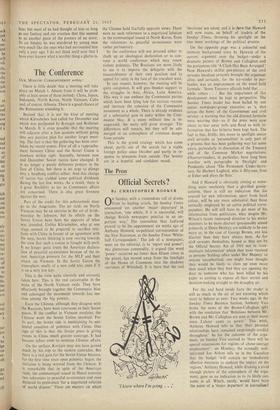The Press
Officiil Secrets?
By CHRISTOPHER BOOKER
ON Sunday, with a tremendous roll of drums from its leading article, the Sunday Times announced yet another 'major departure' in journalism, 'one which, if it is successful, will change British newspaper practice in an im- portant way.' The innovation thus fanfared proved to be the _appointment six weeks ago of Anthony Howard, ex-political correspondent of the New Statesman, as the Sunday Times 'White- hall Correspondent.' The job of a newspaper, went on the editorial, is to 'report real power'; this glamorous commodity, it argued (the word 'power' occurred no fewer than fifteen times in the piece), has moved away from the limelight of the House of Commons into the shadowy corridors of Whitehall. It is there that the real
'I know where I'm going . .
'decisions' are taken; and it is there that Howard will now roam, on behalf of readers of the Sunday Times, throwing his spotlight on the true inner workings of the political process.
On the opposite page was a colourful and intimate background story by H,oward of the current argument over the budget—under a dramatic picture of Brown and Callaghan and the portentous title 'A Clash Has Been Arranged.' Now Howard's skilful pen-picture of the civil servants involved certainly brought the argument alive, and certainly, for the lay-leader in par- ticular, was an improvement on the usual bald formula: 'Some Treasury officials hold that . . . while others . . .' But the importance of this development must be kept in perspective. The Sunday Times leader has been hailed by one senior newspaper-group executive as 'a shot across the bows' of the Government and civil service—a warning that the old discreet formulre were wearing thin—as if the press were now about to tear away veils and flood us with in- formation that has hitherto been kept back. The fact is that, firstly, this move to spotlight senior civil servants as 'personalities' is only part of a process that has been gathering way for some years, particularly in discussion of the Treasury and of the Common Market negotiations; Observer-readers, in particular, have long been familiar with paragraphs in 'Daylight' and Pendennis about 'The Permanent Under-Secre- tary, Sir Herbert Logbird, who is fifty-one, lives at Esher and plays the flute.'
And if Howard is obviously aiming at some- thing more revelatory than a glorified gossip- column, there is still no indication that his sources for new information, apart from local colour, will be any more substantial than those normally employed by an active political corre- spondent. He will still have to get most of his information from politicians, who, despite Mr. Wilson's recent rumoured directive to his senior ministers to be more discreet (presumably aimed primarily at Denis Healey), are unlikely to be any more or, in the case of George Brown, any less discreet than they have always been. As for civil servants themselves, bound as they are by the Official Secrets Act of 1911 not to 'com- municate information' which they have received as persons 'holding office under Her Majesty' to anyone unauthorised, one might have thought they would be likely to clam up even more than usual when they find they are opening the door to someone who has been billed by his paper as coming to expose all their secrets and decision-making straight to the draughty air.
For the real hard inside facts the reader is still as much in the air of not knowing which story to believe as ever. Two weeks ago, in the Sunday Times Business Section, Anthony Vice broke the news of the Brown-Callaghan split with the revelation that 'Relations between Mr. Brown and Mr. Callaghan are now at their worst since Labour came to power.' This week, Anthony Howard tells us that 'their personal relationships have remained surprisingly cordial throughout.' As for the outcome of the argu- ment, on Sunday Vice assured us 'there will be special concessions for regions of above-average employment': on Monday, the normally well- informed Ian Aitken tells us in the Guardian that the budget 'will contain no immediately effective measures to cushion the impact on the regions.' Anthony Howard, while drawing a vivid enough picture of the atmosphere of the argu- ment, gave us no indication as to its likely out- come at all. Which, surely, would have been the point of a 'major departure' in journalism?


































 Previous page
Previous page